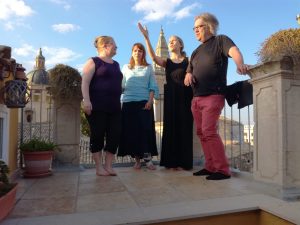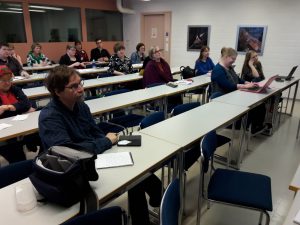Past Events
Researchers / Letters / Emotions
April 8th–9th, 2019
University of Eastern Finland, Joensuu campus, Futura building, room F101
The growing interest in using letters and diaries as research material in the humanities and the social sciences raises also new questions about interpretation of such materials. Together with other forms of “personal documents” (Stanley 2013), letters and diaries present also a special challenge for ethics of interpretation. How to deal with emotional aspects of correspondence? What about academic objectivity? The project “Russia as a field and an archive – Constructing Finnishness among ethnographers of 19th– and 20th-century Finland” warmly welcomes researchers interested in these topics to participate in this seminar on using personal documents as a source for disciplinary histories or personal lives in a wider sense.
Programme
Monday 8th of April
12:15 – 13:00 Jyrki Pöysä: Personal documents as a source in studies of academic lives
13:00 – 14:00 Leonid Chekin: Famous Danish linguist Rasmus Rask in Finland
14:00 – 14:15 Coffee break
14:15 – 14:45 Päivi Laine: First Finnish ethnographer A.J. Sjögren’s networks in St. Petersburg
14:45 – 15:15 Tiina Seppä: Darker sides of the correspondence of Samuli Paulaharju
15:15 – 15:45 Elina Niiranen: Personality missing? – diaries of Pertti Virtaranta, devoted researcher of Karelia
15:45 – 16:00 Coffee break
16:00 – 16:30 Leila Virtanen: The letters of Elli-Kaija Köngäs-Maranda – a place for introspection
16:30 – 17:00 Discussion
Tuesday 9th of April
9:15- 11:45 Workshop
11.45 – 13:15 Lunch
13:15 – 14:15 Taina Kinnunen: Touch biographies as an archive of affectivities
14:15 – 15:00 Leena Kurvet-Käosaar: Tracing strategies of intimacy in family letters – a pursuit of an epistolary melody
15:00 – 15:15 Coffee break
15:15- 16:00 Lisa Svanfeldt-Winter: Navigating expectations and academic models to make it in folklore studies 1918–1932
16:00 – 16:45 Tuulikki Kurki: Soviet Finnish writers’ correspondence
16:45 – 17:00 Closing discussion
——————————————————————-
 Panel (Life) narratives and encounters in the field and archive
Panel (Life) narratives and encounters in the field and archive
at the ISFNR Interim Conferece, Ragusa, Italy. June 12-16, 2018
Panel Abstract
Archives, sites of ethnographic field documents and other records of human lives, serve a crucial function in folk narrative research. Yet folklorists are quick to recognize that these oft-treasured texts can be dismissed as pale textual representations of the communicative events which they describe. The field context constitutes more than simply a site for the inscription and documentation of ethnographic texts—to be sure, field work always involves multimodal human encounters, the very stuff of “being there.” These encounters ultimately place multiple aspects of both the researcher’s and the informant’s lives face-to-face. Corporeality, feelings, and emotions all leave their mark on the texts inscribed.
This panel explores the possibility of broadening and deepening our understanding of archived life narratives by examining the textual traces of the lives of both the researchers/collectors and the informants/tradition bearers. The approach seeks new methodological opportunities for paying attention not only to narrative units themselves, but also to the ideological, experiential, and ontological backgrounds of those who were involved in fieldwork. In this panel, it is our standpoint that archival research, the study of documents created in the past, even when it is undertaken long after the original encounters took place, invariably requires serious attention to the material aspects beyond the archival texts in interpretation of the documents.
Individual Paper Abstracts
Karina Lukin: Recording Narratives, Recording Linguistic Ideologies
The image of the slow-witted native is a recurring motif in the history of folklore studies, ethnography, and linguistics. This is also the case in Finnish research history within which numerous minorities or indigenous peoples designated as “related peoples” have been studied. Depictions of these people, living mostly in Russia, have been imbued with both glory and respect as well as with disgust and denigration, representations which have thus served to magnify the researchers’ own understandings and interpretations and downplay possible perspectives of the informants. Nonetheless, the interpretations of both parties have had an indelible impact on the nature of the narratives that have been collected and archived.
This paper aims at reading the researchers’ descriptions of the fieldwork contexts anew, highlighting the point of view of the informants, and not those of the researcher, who then had the authority to describe the context. I will focus on both M. A. Castrén’s and Toivo Lehtisalo’s descriptions of their encounters with their Nenets informants. The encounters will be read as meetings between two differing linguistic ideologies, encounters which have had a considerable influence on the conduct of both parties and the interpretations they have made regarding the communicative situation.
Elina Niiranen: Linguistic strategies and nationalist features in cross-cultural Finnish-Karelian fieldwork
Finnish researchers have long viewed Karelians, who lived in Russian Karelia and later in the Soviet Union, through the lens of the Finnish nationalistic project. This perspective has shaped the fieldwork done by Finnish folklorists, musicologists, and linguists among Karelians during the 20th century and at the beginning of 21st century. For Finnish researchers, Karelian culture has represented a connection to the origins of Finnish culture and their ancestral roots. This perception of Karelia has thus informed the cross-cultural contacts between Finnish researchers and Karelian informants, making them complicated and charged. Moreover, political tensions between Finland and the Soviet Union also affected interactions between Finns and Soviet Karelians. Attitudes and ideologies underlying behavior and linguistic strategies used have consequences on the collected data and interpretations made by researchers. My paper focuses on the work of the Finnish linguist Pertti Virtaranta (1918-1997). Although he identified more strongly with Finno-Ugrists than he did with nationalists, nationalistic features can be discerned in the fieldwork he did among Karelians from1950 to the 1990s. He was known as a very capable and experienced fieldworker who has had a significant influence on Karelian research in both Finland and in the Soviet Union. In this paper, I pay careful attention to Virtaranta’s inclination to collect linguistic material in authentic speech situations.
Jyrki Pöysä: Narrated lives of 19th-century Finnish ethnographers and linguists
The history of Finnish humanities, especially the so-called national sciences (history, archeology, linguistics, ethnography, folklore studies) portrays the lives of certain key academic figures in a glorified manner. Indeed, they have been canonized as mythological heroes of the building of the nation. The exemplary life-narratives were written for the public audience with a pedagogic and nationalistic purposes in mind and disseminated with the help of voluntary cultural organizations and schools. In my paper, I present two examples of such national glorification, the lives of ethnographers/linguists Anders. J. Sjögren (1795-1855) and Matthias A. Castrén (1813-1852). In 19th-century Finland, both men occupied special positions regarding to nation building: Castrén, as first professor of Finnish language in the University of Helsinki, and Sjögren, as academician in the Russian Academy of Sciences in St. Petersburg. The narrated lives of both men share many of the same thematic features: both experience poverty in childhood, are exceptionally talented and hard-working in school and university, carry out heroic travels in the northern areas of the Russian Empire, suffer severe hardship and disease, but nonetheless persist in their search for ways to promote Finnish culture and society within the Russian Empire, of which Finland was an autonomous part until 1917. Yet there are also interesting differences between these two life stories: while Castrén was regarded as a Finnish scholar (though also his travels were funded by the Russian Academy of Sciences), Sjögren’s loyalty to Finland was questioned, for example, by Johan V. Snellman (1906-1881), an important political figure and leader of the “Fennomans” (a political movement for the Finnish language and nation). Although the ambiguity surrounding Sjögren’s position as a Finnish and a Russian academician has been later removed from his public image in Finland, it remains an important factor to keep in mind when reading Sjögren’s detailed, life-long diaries and autobiography written in 1845 (See: Branch 1968). In my paper, I study the narrative positionings (See: Bamberg 2003) of these key figures on the basis of “documents of life” (Ken Plummer, Liz Stanley) and public life histories written for academic and public audiences.
Tiina Seppä: The Making of the National Narrative. Material and Immaterial Conditions
This presentation considers the material and immaterial conditions, that is, the everyday life underlying the collection of folklore materials and the production of a national narrative in Finland. In addition, it brings to light the quotidian and even dreary aspects of the nation-building process, which is still performed and represented as a noble and unifying project of the Finns.
The material and immaterial conditions of the grand narrative of Finland are foremost conditions of individuals, the agents and actors working for the national, idealistic purposes. Moreover, the national narrative includes and conceals numerous cultural encounters: not only between ethnographers and their informants—such as rune singers – but also between ethnographers and academia, in other words, encounters between different social classes, cultural understandings, world views and economic conditions. In this presentation, I focus on one case: famous ethnographer and folklore collector, as well as writer, Samuli Paulaharju.
The primary sources of the study are the archived biographical materials: letters exchanged between the archives and the collectors, field notes and autobiographical sources, for example, diaries. The archive material is primarily housed in the folklore archives of the Finnish Literature Society. My overall aim is to focus on all the material and personal factors that have influenced the ethnographer’s work, among other things, family and close relationships and other affective life experiences. These also surface in the
 SUOMEA LÖYTÄMÄSSÄ – MATKALLA KANSALLISTEN TIETEIDEN IDÄSSÄ
SUOMEA LÖYTÄMÄSSÄ – MATKALLA KANSALLISTEN TIETEIDEN IDÄSSÄ
Seminaari Itä-Suomen yliopiston Joensuun kampuksella 27.4.2018
12:15-12.30 Jyrki Pöysä (dos., Itä-Suomen yliopisto)
Tervehdyssanat ja hankkeen esittely
12:30-13:30 Johanna Laakso (prof., Univ. Wien, Institut für Europäische und Vergleichende Sprach- und Literaturwissenschaft, Abteilung Finno-Ugristik)
Miehet ja naiset Suomea löytämässä
13:30-14:30 Eila Stepanova (FT, Helsingin yliopisto, Tutkijakollegium)
Itkijän ja kerääjän kohtaaminen kentällä
14:30-15:00 Kahvitauko
15:00-15:30 Tiina Seppä (FT, Itä-Suomen yliopisto)
”Tämä vasta on miehen elämää!” – Samuli Paulaharju heimosodan pyörteissä
15:30-16:00 Helena Lonkila (FT, Jyväskylän yliopisto)
Arkiston ja maisemassa liikkumisen yhteys – kulttuurisemioottinen näkökulma
16:00-16:15 Tauko
16:15-16:45 Elina Niiranen (FT, Tampereen yliopisto)
Ystävyyttä, yhteistyötä ja avunantoa – Pertti ja Helmi Virtaranta kentällä Neuvostoliitossa
16:45-17:15 Karina Lukin (FT, Helsingin yliopisto)
Paino sanalla suomi – Castrénin hiljaiset informantit
17:15-17:30
The project Russia as a Field and Archive in collaboration with the Academy of Finland:
